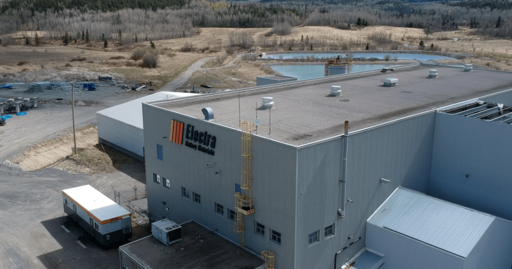This story was originally published by Canada’s National Observer and is reproduced here as part of theClimate Desk collaboration.
Ontario is backing a $100-million investment to build North America’s first battery-grade cobalt refinery, aimed at supporting the country’s electric vehicle production at a time when the industry is struggling with slowing sales and a deepening trade war with the US.
Led by Toronto-based Electra Battery Materials, the plan is to build the refinery in Temiskaming Shores about 250 kilometers northeast of Sudbury.
The Ontario government says it will contribute $17.5 million through the Invest Ontario Fund to help fast-track construction. Once completed, the facility would produce 6,500 tonnes of cobalt sulphate a year—enough to support production of up to one million EVs.
The province did not provide details on when construction would begin or be completed.
Ontario Economic Development Minister Vic Fedeli said the project will link northern Ontario’s mineral wealth with southern Ontario’s manufacturing base. “Electra’s investment in Temiskaming Shores will establish an integral link in the province’s critical mineral processing supply chains and fuel the next stages of Ontario’s leadership in electric vehicle battery manufacturing,” said Fedeli in a statement.
The province says the refinery will create local jobs and become North America’s only cobalt sulphate processor—a critical material for lithium-ion batteries—marking a major step “towards the province’s goal of building a complete, made-in-Ontario, critical mineral supply chain.”
Electra CEO Trent Mell said the project is essential to reducing reliance on offshore suppliers, particularly China, which currently refines more than 90 per cent of the world’s cobalt. It will also help safeguard economic and energy security, and ensure Canada plays a leading role in the global energy transition, he added.
“Unless Volkswagen or another automaker is lined up, there’s no customer.”
Canada’s $100 billion EV-sector development strategy faces turbulence. Sales growth has slowed, federal EV mandates are being revised and auto-sector investments are under strain from US tariffs. Earlier this year, Swedish battery-maker Northvolt collapsed, underscoring risks in the sector.
Both Ontario and Ottawa have pledged billions to secure critical mineral projects as a counter to US trade threats, arguing it will create jobs and strengthen economic sovereignty.
The province has promised $500 million for mineral processing, while Ottawa has invested $3.8 billion in exploration, refining and recycling. Early this year, German tech giant Siemens announced a $150-million EV battery research hub in Ontario.
Still, a report from the Canadian Climate Institute warned Canada could lose out on a $12 billion-a-year critical minerals market by 2040 without at least $30 billion in new mining investment. Global demand for copper, nickel, lithium, graphite, cobalt, and rare earths is expected to hit $770 billion by that year.
Experts welcomed the cobalt announcement but raised concerns about execution and market realities.
Ian London, executive director of the Canadian Critical Minerals and Materials Alliance, an industry advocacy group, said the project sounds positive but questioned whether there are buyers lined up given the struggling EV market. “Where is the customer? Who has committed to buying the cobalt and at what price?” he asked. “Otherwise, this feels like a supply-push model rather than demand-pull. You can say the refinery will support EV battery plants, but unless Volkswagen or another automaker is lined up, there’s no customer.”
London said $100 million is likely not enough to build a refinery of this scale and Ontario’s $17.5-million contribution is only a term sheet—a nonbinding agreement that sets out intentions but does not guarantee funding. He cautioned while the plan sounds positive, the real question is whether the plant will actually be built.
He added the refinery could make sense if Ontario secured markets abroad, such as European battery plants, which would reduce dependence on US buyers.
London also stressed that critical mineral investments should be tied to real industrial demand. He pointed to the federal government’s “nation-building” projects, such as high-speed rail, nuclear power and energy infrastructure, that will require large amounts of copper, steel and aluminum, as areas where investment may be more urgently needed.
A recent report from the Financial Accountability Office warns Ontario’s auto industry, a key pillar of the province’s economy, could lose thousands of jobs this year because of the US trade war. The sector makes up $36 billion of Ontario’s $220.5 billion in exports, with 85 per cent of goods headed to the US and most of the 1.54 million vehicles built last year sold to American consumers.
Sheldon Williamson, a professor at Ontario Tech University who focuses on EV battery systems, said the refinery is a strategically important step. The project could strengthen Ontario’s role in the global EV supply chain by making the province more attractive to battery-makers, recycling plants and automakers looking for reliable local suppliers.
Williamson says most cobalt refining currently takes place in Asia, mainly China, leaving North American supply chains exposed to trade risks. “Building North America’s first battery-grade cobalt sulfate refinery on Ontario soil fills a clear gap in the battery supply chain,” he said.
The project shows Ontario is serious about building a domestic battery supply chain, but its success will depend on customers, partnerships and how fast the EV market evolves, he added.
From Mother Jones via this RSS feed


